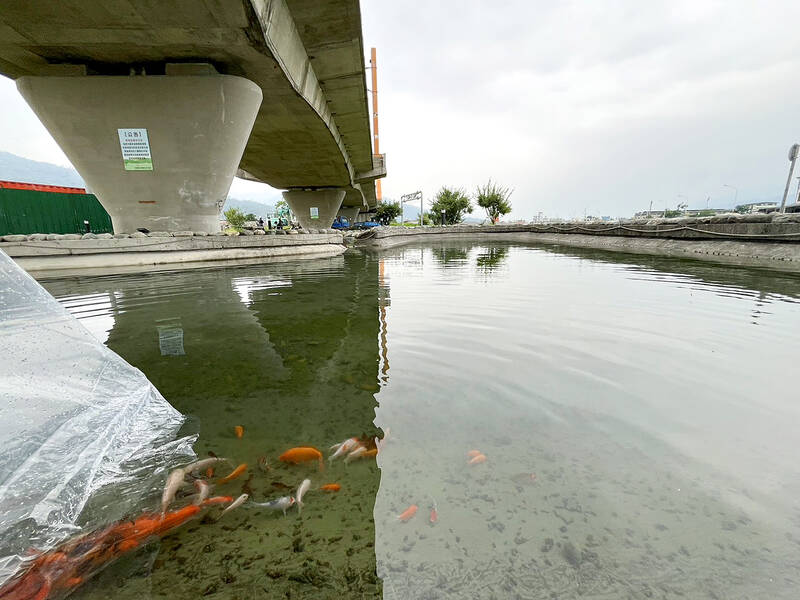The Yuli Township (玉里) Office in Hualien County has sparked controversy after introducing 150 non-native fish into a local park pond as part of a campaign to enhance the area’s biodiversity.
In a social media post earlier this week, the township office announced that it had recently introduced koi fish and red Nile tilapia to the pond to create a more appealing recreational environment.
The post sparked a backlash, however, with most of the 300 comments criticizing the move.

Photo courtesy of the Yuli Township Office
The post followed the deletion of an earlier Facebook statement in which the office said that keeping the two non-native species could “boost biodiversity.”
One commenter wrote: “You deleted the post because you were criticized for claiming these non-native fish can enrich biodiversity... You’re not fooling us.”
Other comments said the office should have consulted ecological experts to avoid adversely affecting the local ecosystem.
Yuli Township Mayor Kung Wen-chung (龔文俊) pushed back against the criticism, saying that both species came from Hualien’s Aquaculture Breeding Institute and were genetically improved varieties that would not harm the environment.
Koi fish, for instance, consume the eggs of golden apple snails — an invasive species known for damaging crops — while red Nile tilapia is a common aquaculture species in ponds and rivers across Taiwan, Kung said.
The township also kept red Nile tilapia in 2018, only for visitors to catch them, prompting the office to request that the public refrain from fishing in the pond, Kung said.
Huang Wen-bin (黃文彬), a professor at National Dong Hwa University’s College of Environmental Studies and Oceanography, said that from an ecological perspective, introducing non-endemic species into the wild is inappropriate.
Huang commended the township for its desire to create a more attractive environment for visitors, but said heavy rain or flooding could allow the fish to escape and affect other ecosystems.
Huang said that he did not think they were likely to threaten native species, as their vibrant colors made them easy targets for predators, making it hard for them to survive in the wild.

Taiwan is to commence mass production of the Tien Kung (天弓, “Sky Bow”) III, IV and V missiles by the second quarter of this year if the legislature approves the government’s NT$1.25 trillion (US$39.78 billion) special defense budget, an official said yesterday. Commenting on condition of anonymity, a defense official with knowledge of the matter said that the advanced systems are expected to provide crucial capabilities against ballistic and cruise missiles for the proposed “T-Dome,” an advanced, multi-layered air defense network. The Tien Kung III is an air defense missile with a maximum interception altitude of 35km. The Tien Kung IV and V

The disruption of 941 flights in and out of Taiwan due to China’s large-scale military exercises was no accident, but rather the result of a “quasi-blockade” used to simulate creating the air and sea routes needed for an amphibious landing, a military expert said. The disruptions occurred on Tuesday and lasted about 10 hours as China conducted live-fire drills in the Taiwan Strait. The Civil Aviation Administration (CAA) said the exercises affected 857 international flights and 84 domestic flights, affecting more than 100,000 travelers. Su Tzu-yun (蘇紫雲), a research fellow at the government-sponsored Institute for National Defense and Security Research, said the air

A strong continental cold air mass is to bring pollutants to Taiwan from tomorrow, the Ministry of Environment said today, as it issued an “orange” air quality alert for most of the country. All of Taiwan except for Hualien and Taitung counties is to be under an “orange” air quality alert tomorrow, indicating air quality that is unhealthy for sensitive groups. In China, areas from Shandong to Shanghai have been enveloped in haze since Saturday, the ministry said in a news release. Yesterday, hourly concentrations of PM2.5 in these areas ranged from 65 to 160 micrograms per cubic meter (mg/m³), and pollutants were

Taiwan lacks effective and cost-efficient armaments to intercept rockets, making the planned “T-Dome” interception system necessary, two experts said on Tuesday. The concerns were raised after China’s military fired two waves of rockets during live-fire drills around Taiwan on Tuesday, part of two-day exercises code-named “Justice Mission 2025.” The first wave involved 17 rockets launched at 9am from Pingtan in China’s Fujian Province, according to Lieutenant General Hsieh Jih-sheng (謝日升) of the Office of the Deputy Chief of the General Staff for Intelligence at the Ministry of National Defense. Those rockets landed 70 nautical miles (129.6km) northeast of Keelung without flying over Taiwan,